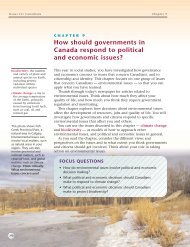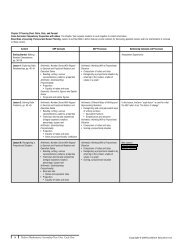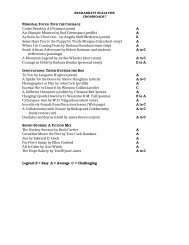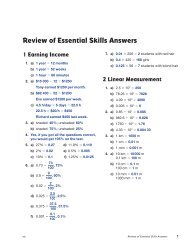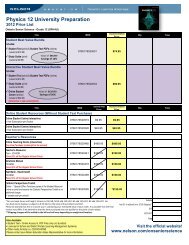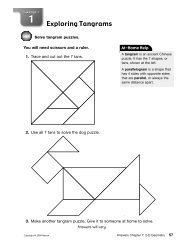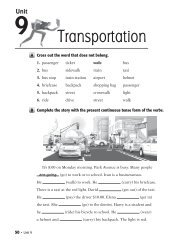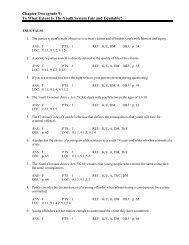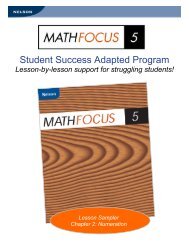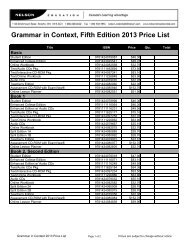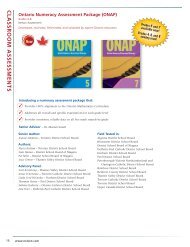4.B.2. Evaluating Internet ResourcesAnyone can post information on the Internetwithout verifying its accuracy. Therefore, you mustlearn to evaluate the information that you findon the Internet as coming from dependable andlegitimate sources.Use the following questions to help determine thequality of an Internet source. The greater the numberof questions answered “yes,” the more likely it is thatthe source is of high quality.• Is it clear who is sponsoring the page? Doesthe site seem to be permanent or sponsoredby a reputable organization?• Is there information about the sponsoringorganization? For example, is a telephonenumber or address given to contact for moreinformation?• Is it clear who developed and wrote theinformation? Are the author’s qualificationsprovided?• Are the sources for factual information givenso that they can be checked?• Are there dates to indicate when the page waswritten, placed online, or last revised?• Is the page presented as a public service? Doesit present balanced points of view?4.B.3. Using School Library ResourcesMany schools and school boards have access toonline encyclopedias with science sections in them.Find out if your school or board has a website whereyou can access these resources. You may need apassword.4.B.4. Using the <strong>Nelson</strong> WebsiteWhen you see the <strong>Nelson</strong> Science icon in yourtextbook, you can go to the <strong>Nelson</strong> website and findlinks to useful sources of information.go to nelson science4.C. Exploring an IssueCriticallyAn issue is a situation in which several points of viewneed to be considered in order to make a decision. Itis often difficult to come to a decision that everyoneagrees with. When a decision affects many people orthe environment, it is important to explore the issuecritically. Think about all the possible solutions andtry to understand all the different perspectives—notjust your own point of view. Consider the risks andbenefits of each possible solution. Put yourself inthe place of several of the stakeholders, to try tounderstand their positions.Exploring an issue critically also means researchingand investigating your ideas and communicating withothers. Figure 3 shows all the steps in the process.Explore an IssueDefining the IssueResearchingIdentifying AlternativesAnalyzing the IssueDefending a DecisionCommunicatingEvaluatingFigure 3 You may perform some or all of these steps as you explorean issue critically.CSH-F20-SHOS10SB.aiNot sure if this is the correct arrow style for flow charts.620 Skills Handbook NEL
4.C.1. Defining the IssueTo explore an issue, first identify what the issueis. An issue has more than one solution, and thereare different points of view about which solution isthe best. Rephrase the issue as a question: “Whatshould …?” The issue can also include informationabout the role a person takes when thinking aboutan issue. For instance, you may think about the issuefrom someone else’s point of view—you may take therole of a landowner, a government worker, or a tourguide. The issue can also include a description ofwho your audience will be—will it be other students,a meeting of government officials, or your parents?Be sure to take into account your role and audiencewhen defining your issue.4.C.2. ResearchingEnsure that the decision you reach is based on agood understanding of the issue. You must be in aposition to choose the most appropriate solution. Todo this, you need to gather factual information thatrepresents all the different points of view. Developgood questions and a plan for your research. Yourresearch may include talking to people, reading aboutthe topic in newspapers and magazines, and doingInternet research.As you collect information, make sure that itis reliable, accurate, and current. Avoid biasedinformation that favours only one side of the issue.It is important to ensure that the information youhave gathered represents all aspects of an issue.Are the sources valuable? Could you find betterinformation elsewhere?4.C.3. Identifying AlternativesConsider possible solutions to the issue. Differentstakeholders may have different ideas on this.Consider all reasonable options. Be creative aboutcombining the suggestions. For example, supposethat your municipal council is trying to decide howto use some vacant land next to your school. You andother students have asked the council to use the landas a nature park. Another group is proposing thatthe land be used to build a seniors’ home becausethere is a shortage of this kind of housing. The schoolboard would like to use the land to build a track forsporting events.After defining the issue and researching, you cannow generate a list of possible solutions. You might,for example, come up with the following choices forthe land-use issue:• Turn the land into a nature park for thecommunity and the school.• Use the land as a playing field and track forthe community and the school.• Create a combination of a nature park and aplaying field.• Use the land to build a seniors’ home witha nature park.4.C.4. Analyzing the IssueDevelop criteria to evaluate each possibility. Forexample, should the solution be the one that has themost community support, or should it be the one thatbest protects the environment? Should it be the leastcostly, financially, or the one that creates the mostjobs? You need to decide which criteria you will useto evaluate the alternatives so that you can decidewhich solution is the best.4.C.5. Defending a DecisionThis is the stage where everyone gets a chance toshare ideas and information gathered about the issue.Then the group needs to evaluate all the possiblealternatives and decide on one solution based onthe criteria.Cost–Benefit AnalysisA cost−benefit analysis can help you determine thebest solution to a complex problem when a numberof solutions are possible. First, research possible costsand benefits associated with a proposed solution.Costs are not always financial. You may be comparingadvantages and disadvantages. Then, based on yourresearch, try to decide the level of importance of eachcost and benefit. This is often a matter of opinion.However, your opinions should be informed byresearched facts.NEL4. Research Skills 621



